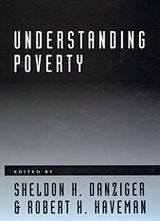
America Unequal demonstrates how powerful economic forces have diminished the prospects of millions of Americans and why "a rising tide no longer lifts all boats." Changes in the economy, public policies, and family structure have contributed to slow growth in family incomes and rising economic inequality. Poverty remains high because of an erosion of employment opportunities for less-skilled workers, not because of an erosion of the work ethic; because of a failure of government to do more for the poor and the middle class, not because of social programs.
There is nothing about a market economy, the authors say, that ensures that a rising standard of living will reduce inequality. If a new technology, such as computerization, leads firms to hire more managers and fewer typists, then the wages of lower-paid secretaries will decline and the wages of more affluent managers will increase. Such technological changes as well as other economic changes, particularly the globalization of markets, have had precisely this effect on the distribution of income in the United States.
America Unequal challenges the view, emphasized in the Republicans' "Contract with America," that restraining government social spending and cutting welfare should be our top domestic priorities. Instead, it proposes a set of policies that would reduce poverty by supplementing the earnings of low-wage workers and increasing the employment prospects of the jobless. Such demand-side policies, Sheldon Danziger and Peter Gottschalk argue, are essential for correcting a labor market that has been increasingly unable to absorb less-skilled and less-experienced workers.

Why is there so much poverty in America in the 1990s? What can be done to reduce it? In this book the leading experts review three decades of research on the nature, causes, and consequences of poverty, and prescribe an antipoverty agenda for the next decade. The authors document trends in poverty and income inequality, review government programs and policies, and analyze the public’s complicated attitudes concerning these policies. They discuss the persistence and inter-generational transmission of poverty, the extent of welfare dependence, and the emergence of an urban underclass.
Confronting Poverty proposes thoughtful reforms in employment and training, child support, health care, education, welfare, immigration, and urban policies, all crafted from the successes, as well as the failures, of policies over the past three decades. Although antipoverty efforts have been frustrated by slow economic growth, rising inequality, and changes in family structure, the authors offer insightful proposals that will help us resolve the American paradox of “poverty amidst plenty.”

Decades after President Johnson initiated the War on Poverty, it is time for an unbiased assessment of its effects. In this book a distinguished group of economists, sociologists, political scientists, and social policy analysts provide that assessment. Spending on social programs has greatly increased, yet poverty has declined only slightly. Do the numbers alone give an accurate picture? Have the government's efforts, as some critics claim, done more harm than good? The authors of this volume provide a balanced and wide-ranging analysis of antipoverty policies since the 1960s, including both successes and failures.
The evidence shows that simple comparisons of spending levels and poverty trends do not tell the whole story: they obscure the diversity of the poor population and the many complex issues involved in evaluating policies. The authors address such questions as: How do economic growth, social movements, and changes in thewelfare system affect the poor? What economic and political factors influence antipoverty programs, and conversely, what implications do these programs have for employment, education, health care, family structure, and civil rights?The authors' account of past failures and their agenda for the next decade show clearly that much remains to be done. Yet they are not as pessimistic as some writers, who maintain that nothing will work. Rather, they say, nothing will work miracles.
As a guide to the economics and politics of antipoverty programs, this volume is peerless. It is certain to become an important reference for students and scholars in the field, for policy analysts and policymakers, and for program administrators.

In spite of an unprecedented period of growth and prosperity, the poverty rate in the United States remains high relative to the levels of the early 1970s and relative to those in many industrialized countries today. Understanding Poverty brings the problem of poverty in America to the fore, focusing on its nature and extent at the dawn of the twenty-first century.
Looking back over the four decades since the nation declared war on poverty, the authors ask how the poor have fared in the market economy, what government programs have and have not accomplished, and what remains to be done. They help us understand how changes in the way the labor market operates, in family structure, and in social welfare, health, and education policies have affected trends in poverty. Most significantly, they offer suggestions for changes in programs and policies that hold real promise for reducing poverty and income inequality.

READERS
Browse our collection.
PUBLISHERS
See BiblioVault's publisher services.
STUDENT SERVICES
Files for college accessibility offices.
UChicago Accessibility Resources
home | accessibility | search | about | contact us
BiblioVault ® 2001 - 2024
The University of Chicago Press









